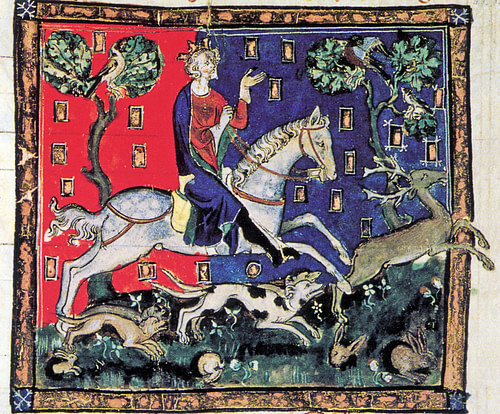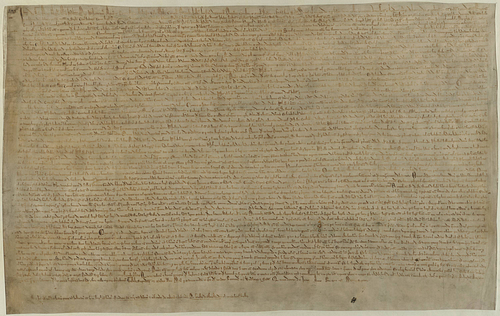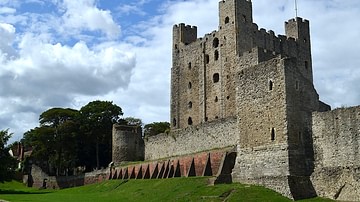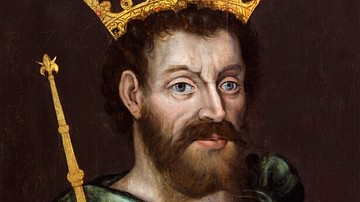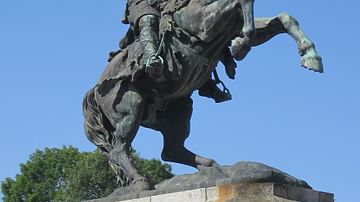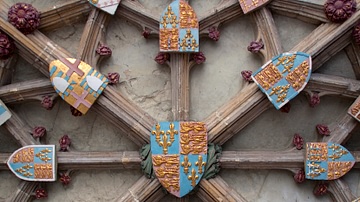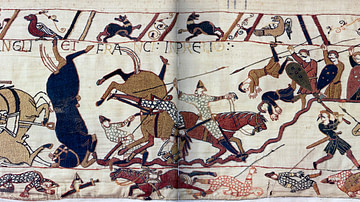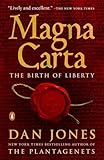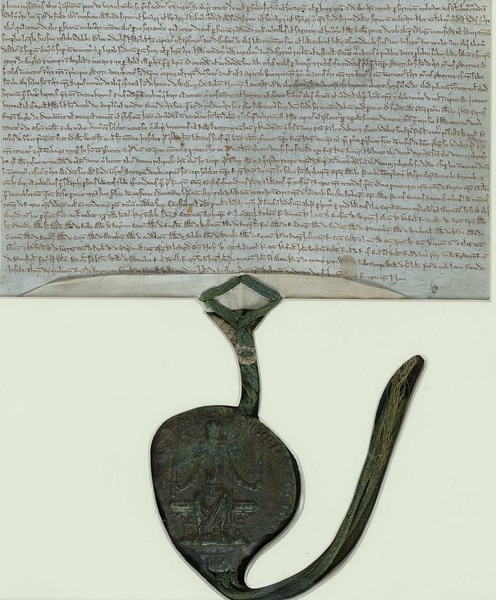
The Magna Carta or 'Great Charter' was an agreement imposed on King John of England (r. 1199-1216) on 15 June 1215 by rebellious barons in order to limit his power and prevent arbitrary royal acts like land confiscation and unreasonable taxes. Henceforward, the king would have to consult a defined body of laws and customs before making such declarations.
The Magna Carta ensured that all freemen were protected from royal officers and had the right to a fair trial. Consequently, the charter became a symbol of the rule of law as the ultimate sovereign. Although not entirely successful in its aims, the charter did permit further constitutional developments in England in subsequent centuries and it provided inspiration for similar models of limited monarchy in other European states.
Background: Kings Richard & John
King John, also known as John Lackland, has the unfortunate distinction of being one of England's most unpopular monarchs. Reigning from 1199, John had previously tried to wrest the throne from his brother and fellow Angevin Richard I of England (r. 1189-1199) while he was abroad. Richard the Lionheart had been busy in the Holy Land with the Third Crusade (1189-1192) and was then captured by Henry VI, the new Holy Roman Emperor (r. 1191-1197) while on his return journey to England. John seized his chance and tried to claim the throne for himself but in the ensuing civil war, forces loyal to Richard managed to hold on to such strategic castles as Windsor Castle and Nottingham and John was defeated. Eventually freed after the payment of an enormous ransom, Richard retook his rightful place on the throne of England in 1194. As it turned out, Richard, in any case without children of his own, nominated John as his heir before his own death in battle in Aquitaine in April 1199.
John might have got the crown he had always wanted in 1199 but he had an immediate struggle to keep it. In nominating John, Richard I had by-passed Prince Arthur, the son of John's older brother George. Arthur's claims were supported by Philip II of France (r. 1180-1223), who had battled with Richard in the previous decade over Angevin-controlled lands in France. John ordered the murder of Arthur in 1203 and Philip responded by conquering most of Aquitaine in 1204-5.
To add to his troubles, John also had a major spat with the Church. Disagreeing with Pope Innocent III (r. 1198-1216) over who should be the Archbishop of Canterbury, the king appointed his own man and the Pope responded by encouraging Philip II to invade England. In the meantime, the Pope ordered the closure of all churches in England and excommunicated John in 1209. The idea that the king was chosen by God to rule, the so-called divine right of kings, was looking a little problematic for John to use as a basis for his authority now that the Church had abandoned him. In 1213 John was forced to capitulate and accept the Pope's nomination for archbishop.
The Barons
John's oppressive regime with its repeated acts of tyranny, his cavalier attitude to the divine right of kings in all matters, and his military failures, especially the loss of Normandy as a result of the 1214 Battle of Bouvines, brought about a major uprising of the English barons (the large estate owners), many of whom had lost estates in France. Worst of all was the incessant taxes John imposed which he needed to pay for the campaigns against the French king. As with Richard before him, John was not lacking in imagination in creating new forms of taxation or ways to fleece the rich so as to fill up the state coffers. The king increased certain taxes such as those due when a noble's daughter was to be married as well as those on towns and merchants. The tax payable in order to receive an inheritance was increased, too. The Crown confiscated the lands of those nobles who died without heirs and the same policy was applied to church lands. Another particularly contentious decision was for the king to move many legal cases from the baron's own courts to his royal ones (although the process had actually started during the reign of John's father, Henry II, r. 1154-1189). The barons gained a handy income from court fines and so fewer cases meant a drop in their revenue.
With all of these factors combining to create a deeply unpopular monarch, the barons demanded constitutional reform. The barons, instead of forming armies to help the king regain Normandy, as he requested, acted collectively and marched to London where their numbers were swelled by discontented merchants. With the barons in control of London and a number of them even renouncing their oath of allegiance to the king and, instead supporting the nobleman Robert Fitzwalter (1162-1235), John had little choice but to give in to their demands. The barons thus obliged the king to sign the Magna Carta in 1215, upon which a constitution was based that curbed the power of the monarch and protected the rights of the barons.
Magna Carta
The Magna Carta was signed and sealed by King John at Runnymede, just outside London in June 1215. The document set out to limit royal power (including agents of the king's authority such as sheriffs) which seemed to have been growing without check in the previous decades.
The Magna Carta contained 63 clauses which set out the following key changes:
- It defined the limits of royal power over the people according to established feudal principles.
- It obliged the monarch to consult the barons in a Great Council before levying taxes.
- It guaranteed all freemen (but not serfs) protection from royal officers.
- It gave to all freemen the right to a fair legal process if they faced criminal charges.
- It permitted merchants to travel into and out of England without restriction.
- It stipulated that widows did not have to pay anything to receive their husband's estate (dower) and they were not forced to remarry.
It is perhaps important to remember that in 13th-century England 'freemen' constituted less than 25% of the population and, in any case, the barons were not concerned with them but rather with their own position. The primary aim of the Magna Carta, then, was to ensure the king did not impinge on the rights of feudal lords. This was expressed by the barons explicitly insisting on their involvement in the system of taxation and their independence in building, inhabiting and controlling castles.
Barons' Wars
To ensure the king did what he had signed to do, a committee of 24 barons was formed to monitor his rule thereafter. However, the very acceptance of the Magna Carta did not appease all rebel barons and neither did King John turn himself into a constitutional sovereign overnight; indeed, he repudiated the Charter before his royal seal had barely had time to harden. The barons did not fulfill their side of the bargain either and refused to hand over London until John implemented the terms of the charter. It was a stalemate situation.
John appealed to Pope Innocent III who, in a turnaround of policy and support, declared the Magna Carte illegal and invalid in a papal bull. There followed between 1215 and 1217 a series of conflicts known as the Barons' Wars (there would be others later in the century). Some barons even supported Prince Louis, the future King Louis VIII of France (r. 1223-1226). However, the rebels were heavily defeated at the battle of Lincoln in May 1217 and the First Barons' War came to an end with the Treaty of Kingston-on-Thames in September 1217. Although neither the barons nor King John had wholly adhered to the terms of the Magna Carta, it was confirmed in 1225 by John's son and successor Henry III (r. 1216-1272) on his coronation, perhaps even as a condition of it. Although hardly causing an immediate swing from absolute monarchy to constitutional government, the Magna Carta, nevertheless, was a major step on that road and, certainly, it prevented future English kings or queens from ruling entirely as absolute monarchs.
Legacy
In subsequent centuries the Magna Carta became a rallying point for all future calls to curb the power of monarchs in England (and elsewhere) and these movements eventually led to the formation of such now-familiar institutions like parliament, ensuring that the rule of a monarch was, at least to some degree, conducted according to the wishes and benefit of their subjects. The Magna Carta has even been the inspiration for many more recent documents and declarations which have set out principles of law and government. These include the 1791 United States Bill of Rights and the 1948 Universal Declaration of Human Rights.
Back in Britain, four of the charter's clauses are still valid as English law (the others having been repealed or superseded by later legislation). These are the clause protecting the independence of the church, another clause protecting certain rights of London and other towns, and, the most famous part of all the Charter nowadays, clauses number 39 and 40:
No free man shall be seized or imprisoned, or stripped of his rights or possessions, or outlawed or exiled, or deprived of his standing in any other way, nor will we proceed with force against him, or send others to do so, except by the lawful judgement of his equals or by the law of the land.
To no one will we sell, to no one deny or delay right or justice.
Today there are four existing copies of the Magna Carta with two in the British Library in London, one in Salisbury Cathedral and another in Lincoln Castle.
